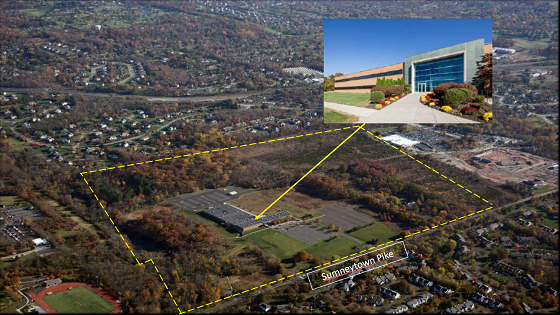You have /5 articles left.
Sign up for a free account or log in.

The property Gwynedd Mercy University sold to an affiliate of Beacon Capital Partners.
Courtesy of Gwynedd Mercy University
A real estate bubble is enveloping many parts of the United States—and colleges are cashing in before it pops. Gwynedd Mercy University in Pennsylvania recently sold a 154-acre property for more than twice what it paid for the land three years ago. Last week, Southwestern University in Texas sold for tens of millions two properties that it has held since the 1930s.
Gwynedd Mercy first bought the plot, located about 22 miles north of Philadelphia, from Merck & Co. pharmaceutical company in 2018 for $12.1 million. The property—which includes a 157,000-square-foot building—doubled the campus footprint, and at the time university officials planned to turn the existing building into an “innovative teaching and learning facility,” said Deanne H. D’Emilio, president of Gwynedd Mercy.
But after completing a facilities planning process and watching the real estate market boom in Gwynedd Valley, university officials changed course.
“We started to look at what space we have available here on the campus and the cost for renovating the property,” D’Emilio said. “And then, with the pandemic, the real estate market in this region really took off, and there was a lot of interest in the property.”
The university sold the property to an affiliate of Beacon Capital Partners, a Boston-based real estate firm, for $31.5 million. The profit nearly doubled the university’s endowment, which was valued at $41 million before the land sale. D’Emilio said that university officials are still determining exactly how to use the profits.
Southwestern was in a similar boat—the private university started receiving offers for two parcels of land, totaling 493 acres, which it was gifted in the 1930s for $1. At the time, the land was worth $56,000.
“Time is your friend,” said Laura Skandera Trombley, president of Southwestern. “There is a real estate bubble happening here. We had been leasing the land for grazing rights, and so with the huge increase in land values here, we thought that this was an ideal time to put those parcels up for sale.”
The properties are not close to the Southwestern campus, which sits in Georgetown, Tex., and the university never planned to develop the land.
“The land was valuable for cattle, and so we just held on to it,” Trombley said. “With Tesla coming and Samsung and all these other businesses coming, there’s just a boom. So we thought—since this is land that we’ve never used and would never use—it seemed appropriate to let go of that land portfolio and put the proceeds into the endowment.”
Southwestern earned $28 million on the sale and put $25 million into its endowment. The university will use the remaining $3 million for strategic projects, including financial aid and salary equity adjustments.
The pandemic has prompted many institutions to re-evaluate their footprints, said Jeff Hubbard, senior managing director of real estate sales at A&G Real Estate Partners.
“Educational institutions are looking at their real estate as a place to potentially create some liquidity,” Hubbard said. “It will support the implementation of whatever their long-term plans are.”
American Jewish University plans to sell “all or part” of its 35-acre campus in Los Angeles and use the funds to increase its community programs and academic offerings, which are increasingly digital. Lesley University in Boston is selling 10 historic Cambridge properties to help fund capital improvements across its three campuses.
Some colleges are selling noncore properties—like the parcels that Gwynedd Mercy and Southwestern sold—reducing their occupancy costs and potentially selling lease-back properties, Hubbard said.
D’Emilio said that when university officials re-evaluated Gwynedd Mercy’s footprint, they decided that the university’s need for additional space hadn’t changed. This past fall, the university enrolled 2,304 students, about on par with enrollment numbers over the past decade.
“We have to take into account the fact that some folks are working more remotely than we were before, but we haven’t made any decision to have a smaller footprint,” she said. “We still have plans to invest in strategic options that will grow our innovative teaching and learning options—basically what we had planned to do prior to when we purchased the land.”
Demand for space in Gwynedd Valley, where Gwynedd Mercy is located, is on the rise, said Brian Regli, a real estate professional and member of the university’s Board of Trustees. The biomedical and life sciences industries are expanding around Philadelphia, and companies are looking to buy additional lab space. At the same time, logistics companies like Amazon are also looking to build out distribution and transportation centers.
“There are only certain amounts of land in certain locations that are zoned for that particular use,” Regli said. “It so happened that our property had that use attached to it, and therefore it became a real interest to some of the players who are trying to look at that particular type of market.”




